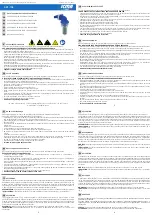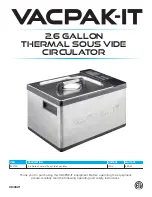
- 8 -
INSTALLATION
MECHANICAL INSTALLATION
A sturdy mounting plate is provided in the sheltered area under the rotating
mechanism. A matching plate must be fabricated as part of the siren
mount. See Figures 5, 6 and 7 for details. The plate must have eight
equally spaced 9/16-inch holes on a 12-inch diameter circle. Mounting to
this plate is then accomplished by means of 1/2-inch bolts, nuts and lock
washers.
POLE MOUNT
Figure 7 illustrates a typical work platform with integral mounting plate.
The design and construction may be varied to suit conditions. The main
requisite is the ability to properly support the weight and wind load of the
siren assembly.
The electric control enclosure is usually mounted lower than the siren, but
at least 8 feet above ground level to discourage attempts at tampering.
Locate the enclosure for easy accessibility by qualified personnel.
IMPORTANT
Refer to Figure 9 for essential information on mechanical and electrical
installation.
ROOF MOUNT
The roof composition spacing of the rafters or beams and the load carrying
capacity must be known and considered. If the roof is capable of
supporting the siren (approximately 450 lbs.), no elaborate sub base is
necessary provided the installed horn height is adequate for the desired
sound coverage. In Snow Belt areas always mount above the highest snow
level expected.
If the roof composition and/or span loading present a problem, a sub base
should be used to distribute the weight. This base can consist of several 4
x 6 inch wood beams of sufficient length beneath the angle iron platform
(see Figure 5) to spread the roof loading.
LIFTING INTO POSITION
1.
When the siren is mounted to the pole before lifting to the vertical
position:
a.
Do not lift
the entire siren and pole by the eyebolt on top of
the siren motor and do not let any weight rest on the
fiberglass parts of the siren.
b.
The primary lift point is the pole and not the eyebolt on the
siren. The gear reducer end of the siren should lead the way
up as the siren and pole are raised to the vertical position (see
Figure 8).
c.
The fiberglass horn may be assembled to the compression
chamber before erection provided no weight is put on the horn
and it does not interfere with erection.
d.
With the pole and siren in final position, proceed with electrical
connections.
2.
When the siren is separate from the pole or platform:
a.
The primary lift point of the siren assembly is the eyebolt
located on top of the motor. This eyebolt is sturdy enough to
lift the 450 lb. siren safely in a vertical direction. Do not lift the
unit in this way if attached to a pole or platform mount.
b.
With the siren mounted in final position, proceed with electrical
connections.
ELECTRICAL CONTROLS
The siren motor leads terminate under the sheltered rotating mechanism.
Attach an approved weatherproof type conduit box at this point.
All electrical controls needed for operating the siren are prewired and contained
inside a weatherproof metal enclosure, which should be mounted near the siren
in a position of easy access to authorized personnel, but out of easy reach of
unauthorized persons. Install conduit between the control box and the siren,
using wire adequate for the power requirements. Refer to Electrical-I
Requirements in Specification section.
IMPORTANT
Always enter electrical control and junction boxes from the bottom to
prevent leakage and water damage. (Refer to Figure 9.)
Control of the siren can be accomplished by either direct switch control,
program timer at the installation, remote control, radio encoder transmitter to
decoder receiver, or telephone lines, from a location different from installation.
The incoming signal actuates the magnetic starter, which, in turn, starts the
siren motor. The system provides thermal overload protection. Refer to wiring
diagrams.
Power for each siren is to be run from an ADEQUATELY FUSED
DISCONNECT SWITCH CONNECTED TO THE POWER SOURCE.
Additional disconnect switches may be required by code between the magnetic
starter and the siren.



































